Trump’s New Afghanistan Plan Sounds A Lot Like Obama’s And Bush’s Plan
Based on initial reports, Trump's Afghanistan policy looks a lot like what we've seen for the past sixteen years.
Tonight at 9pm Eastern time, President Trump will address the nation from Fort Meyer, a military base located in Northern Virginia just a few miles away from the Pentagon, regarding his the policy decisions that have apparently been made regarding America’s future course in Afghanistan, where American troops remain even as we approach the sixteenth anniversary of the September 11th attacks. While we won’t know for sure what the President will be discussing just yet, early reporting suggests that we’re likely to see increased troop levels notwithstanding Trump’s own previous words on the conflict and the pronouncement of his predecessors that have promised some kind of end to what has become the longest war in American history:
President Trump, who has been accused by lawmakers of dragging his feet on Afghanistan, has settled on a new strategy to carry on the nearly 16-year-old conflict there, administration officials said Sunday. The move, following a detailed review, is likely to open the door to the deployment of several thousand troops.
“The president has made a decision,” Defense Secretary Jim Mattis told reporters on an overnight flight that arrived in Amman, Jordan, on Sunday. “I am very comfortable that the strategic process was sufficiently rigorous.”
Mr. Mattis declined to say what steps the president had ordered, including on troop levels, saying that the president wanted to outline the new approach himself.
The defense secretary received the authority in June to send as many as 3,900 troops to Afghanistan so that the United States military could expand its efforts to advise Afghan forces and support them with American artillery and airpower. But Mr. Mattis has refrained from building up the American force there until the Trump administration agreed on a broader strategy.
The White House said in a statement that Mr. Trump would address the American public and American troops “on a path forward for America’s engagement in Afghanistan and South Asia” in a speech at Fort Myer, Va., Monday night.
American military commanders have argued during the monthslong policy assessment that the additional troops would enable the United States to reverse gains made by the Taliban and militant groups like the Islamic State’s Afghan affiliate, the Islamic State in Khorasan.
Administration aides, under orders to let Mr. Trump announce the details, hinted that any American commitment to increase force levels would require steps by the Afghans, like doing more to fight corruption.
Mr. Trump’s Monday evening speech will be his first nationally televised prime-time address since he spoke before Congress in January and follows a week of controversy over his reaction to the racially charged violence in Charlottesville, Va.
When it comes to Afghanistan, Mr. Trump entered office as the skeptic in chief, and any ramped-up engagement there poses political risks for the president, who rallied voters weary of war with his sharp criticisms of American involvement in the country.
“We should have a speedy withdrawal. Why should we keep wasting our money — rebuild the U.S.!” Mr. Trump tweeted about Afghanistan in January 2013, as he considered running for office in 2016.
The Afghanistan question has been the source of a long-running debate at the White House. Stephen K. Bannon, who was recently removed as a top Trump adviser, fought the military’s recommendation for more troops and backed a number of alternative options — including using private contractors instead of United States forces.
The decision on troops is just one component of a military and political plan for the region that Mr. Trump and his aides have been discussing for months, and it is politically important for the president to differentiate his approach from the Obama-era policies he sharply criticized.
Administration officials have been developing ways to try to pressure Pakistan to shut down the sanctuaries there for the Taliban, a goal Republican and Democrat administrations have pursued for years with little success.
A major concern is the Pakistan-based Haqqani network, which American intelligence agencies believe is responsible for some devastating attacks in and around Kabul. Funding for Pakistan, including contributions for Pakistani troops deployed near the border with Afghanistan, may be held up to more scrutiny than it is now, according to Pentagon and congressional officials.
Trump administration officials have also worked to lock in troop commitments from NATO and other Western nations, an important consideration for a president who has demanded that allies shoulder part of the burden.
Trump administration officials say they know they will need to reassure the American public that American military involvement in the nearly 16-year-old conflict will not be open-ended and will help combat international terrorism.
Moreover, many officials believe they need to do so without setting firm deadlines for reducing or withdrawing American troops, a practice President Obama embraced but which Trump officials assert denied the military needed flexibility and played into the hands of the United States’ adversaries.
One way to address that concern, administration officials have said in recent weeks, might be to stipulate that the Afghans would need to satisfy certain conditions, like fighting corruption or improving governance, to continue to receive American economic and military support.
A number of high-level participants in the review have important experience on these issues, especially Lt. Gen. H. R. McMaster, Mr. Trump’s national security adviser, and Maj. Gen. Ricky Waddell, the deputy national security adviser. Each headed an anti-corruption task force in Afghanistan.
Few people think that the war in Afghanistan can be ended anytime soon.
Obviously, the devil of what Trump proposes to do in Afghanistan will be in the details of what’s announced tonight and how it is implemented in the coming months. If these initial reports are correct, though, then it will amount to something of a change in policy for Trump from the rhetoric that we’ve heard from in him the past. Long before he was ever a candidate for President, Trump was pontificating on Twitter on the subject of the war in Afghanistan and at one point suggested that he believed that we should bring American troops home and let the Afghan’s handle the situation themselves. He repeated this idea on the campaign trail both during the Republican Primary and during the General Election. As a candidate, Trump was harshly critical of President Obama’s decisions over the course of his eight years in office which included everything from an initial surge of new forces into a war that candidate Obama had characterized as the “good war” that the Bush Administration was distracted from while pursuing some kind of elusive victory in the quagmire that resulted from the Iraq War. If these initial reports are true, then it would appear that the President has changed his position significantly from what it was when he was a candidate.
No doubt, Trump’s speech will seek to differentiate his policy and plan from that of former President Obama, but the reality is that there’s likely to be little change between what Trump proposes and what the policy and strategy that the United States pursued during the Obama years. Initially, of course, the President began his Presidency by announcing a significant addition of American troops into Afghanistan in an effort to address what had become a resurgent threat to the government in Kabul from the Taliban and other insurgent forces, including groups that eventually announced their allegiance to and/or alliance with ISIS as that group became more powerful in Iraq and Syria. Once American forces had located and eventually killed al Qaeda founder Osama bin Laden, the questions about what this would mean for the course of the war began to surface. Initially, the Obama Administration announced that it had reached an agreement with the
Initially, the Obama Administration announced that it had reached an agreement with the government in Kabul that would result in a gradual drawdown of American forces and end to the war from the American point of view. Under that policy, most if not all American troops would be out of the country by the end of 2016, with the possibility left open that a small force would be left behind to complete the training of the Afghan military so that it would be able to continue the fight against the Taliban. Almost immediately, though, the Obama Administration began making a series of decisions that pushed back the pace of that withdrawal and made it apparent that our commitment there would not be ending within the time promised.
In July of last year, for example, President Obama announced that American troops would be deployed back into combat areas in the country, a reversal of previously announced policy that had stated that American forces would largely be restricted to advisory and training roles while the Afghan Army took over direct combat with the Taliban. This followed a similar announcement earlier in the year that American troops would be deployed back into areas of Afghanistan where active combat was occurring Prior to that, in October 2015, President Obama announced that the withdrawal of U.S. forces would be halted due to the ongoing threat posed by a resurgent Taliban in several Afghan provinces. A year before that, not long after the President had announced the new plan that was supposed to ultimately lead to the final withdrawal of American forces, it was announced that that plan would be changed and that American forces would continue to be involved in combat operations. Several months after that, after the then-new Afghan President Ashraf Ghani visited the United States it was announced that the pace of withdrawal would be slowed even further. Finally, in April 2015 we learned that American forces were involved in more than just the counterterrorism operations that President Obama’s original plan had said they would be limited to. In other words, the history of the past two or three year. All of this seemed to follow a pattern that I predicted would unfold in All of this sounds all too close to a pattern I predicted would unfold:
At this rate, it seem inevitable that we’ll reach a point some time this year when the President will announce, no doubt with frequent use of the word “regretfully” or some similar word, that the previous commitment to remove most American troops by December 31st cannot be met. That announcement will likely come either early in the year or after the election so as to minimize the political impact, but it is the inevitable next step in all of the delays to withdrawal that the Administration has announced over the past fourteen months. More likely than not, the President will simply punt the matter into the future, perhaps by delaying the “official” withdrawal date for six months or so, thus leaving the matter for the next President to decide. All of this will occur contemporaneously with likely future increases in American commitments in Iraq and Syria related to the fight against ISIS, thus leaving quite a lot on the plate for the next President that could very well significantly distract them from being about to carry out any domestic agenda.
Now here we are with a new President, and it seems apparent that there will be no real change from the policy we’ve seen for the past several years, and that America’s military commitment in Afghanistan is unlikely to end anytime soon and probably won’t come to an end at any point during Trump’s first term.
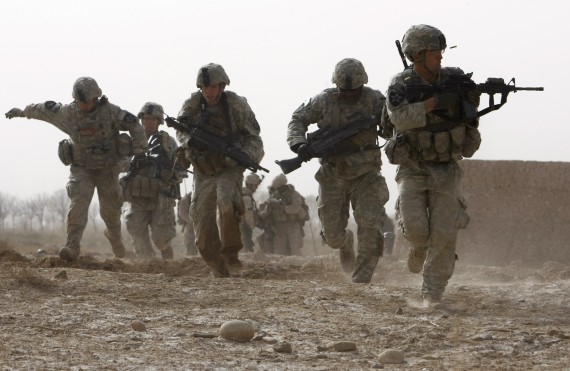

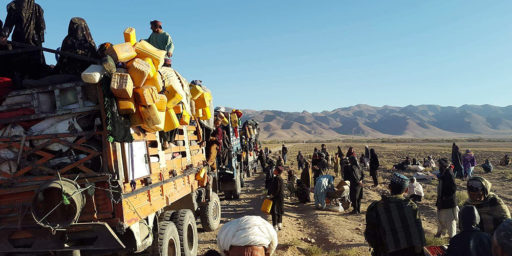
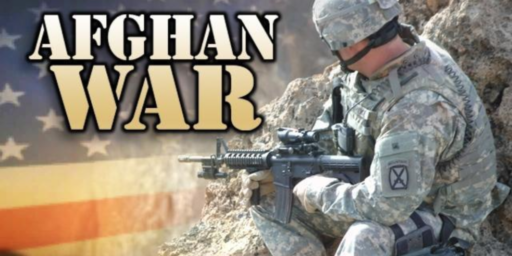
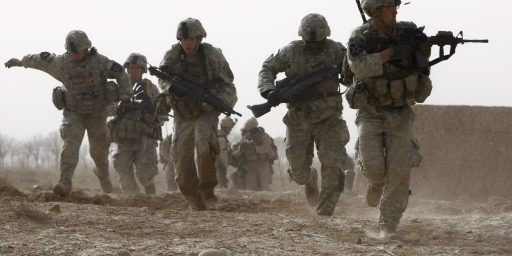
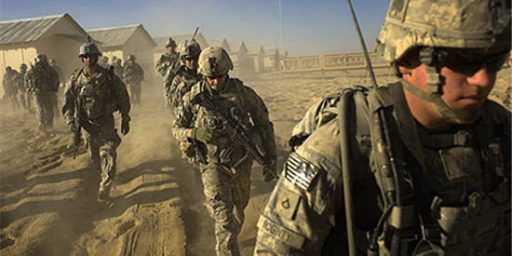
Is anyone actually surprised?
What is the goal there ? What is the plan for victory ?
What is the exit plan ?
If those cannot be explained to the people clearly, they need to get out.
Well, it’s somebody’s plan. Trump will read something off a teleprompter of which he has no foreknowledge and less comprehension. Then he’ll repudiate it tomorrow at his pep rally in Phoenix.
Are we absolutely sure that Trump knows he’s supposed to give this address? He hasn’t Tweeted about it.
Trump’s “strategy” is, of course, an oxymoron. This is some general’s strategy. Is it the right one? The only viable alternative I can think of is to withdraw from Afghanistan, admit that we were unable to nation build, and declare that if the country starts harboring enemies of America again, we will reinvade and destroy the leadership that allowed it to happen. And after that we will again withdraw and make the same notification. And we should do so in the full knowledge that we will almost certainly have to act on our threats and continue to act on them for the foreseeable future.
Is that better? Is there another alternative.
What a shock…that’s only happened with everything…
@Daryl’s other brother Darryl:
It’ll happen with this, you can be sure.
It’s increasingly clear that what we should have done after 911 is launch a massive punitive raid on the Taliban. Massive. Brutal. Start by MOABing the most vital mountain passes in Pashtun country. Hit them hard and step back.
This would undoubtedly have been condemned at the time as disproportionate. But it would have saved us hundreds of US and ally lives and a trillion dollars. At risk of quoting myself (again) the US military is not, and never has been, a scalpel. It is a sledgehammer. Sledgehammer is what we do better than anyone else. We suck at nation-building, we suck at training up local armies, we suck at staying with things over time, but we are amazing at blowing sh!t up.
Had we gone in hard and nasty we could have permanently altered the geography/economy of Pashtunistan, then jetted off leaving the tribesmen no one to shoot at. Message delivered, zero US casualties.
I’m certain that this will all work out and that even if Trump’s moves seem to be a mere continuation of Obama’s policies, that they aren’t because Trump has a secret plan for total victory in Afghanistan. It will be a wonderful victory! Wonderful! Because he has access to the very best troops. Better than any Obama had. And they will lead to an amazing victory. A bigly great victory! It will be wonderful. And amazing.
Hoocudanode.
Of course it’s the same policy as Obama…it’s very difficult to accomplish anything when you spend all your time tweeting about Fox and Friends and golfing.
I think Congress should get in on this at some point.
President Johnson commented on Vietnam that Congress had told Johnson to “do whatever’s necessary” : “the the sky’s the limit”. He then said that “when the road got dusty” some started “looking for the cellar”. (CBS Conkrite interview with Johnson on the Gulf of Tonkin resolution)
I know that there are good people in Afghanistan, but some things their government does is very questionable.
Eisenhower (architect of D-Day) warned about getting involved in these brushfire wars.
https://www.youtube.com/watch?v=uXnJVkEX8O4
@michael reynolds:
Yeah, that’s what I said at the time. Putting boots on the ground was an enormous error. Once that happened everything that’s happened since has been all but preordained.
As I’ve been writing for some time, now we don’t need a change in strategy so much as a change in objectives. Counter-insurgency is a bust.
A serious problem with which we need to come to terms is that no president wants to withdraw from the Afghanistan from which a future attack on the U. S. will emanate.
@Dave Schuler:
It’s so much easier to walk into a trap than to get back out. Sort of the nature of a trap, really.
Obviously the Taliban aren’t an insurgency, they’re much if not most of the non-Kabul population of Afghanistan. What’s needed, if we intend to keep the Kabul government propped up isn’t ‘counter-insurgency,’ it’s ‘pacification,’ which is a whole different and much bloodier thing for which we are not prepared as a people.
I’ve complained at length about ‘proportionality’ as a measure of response. It means putting a price on terrorist acts, a price the enemy is evidently willing to pay. Retaliation that is proportional is nothing but a transaction – you kill ten Americans, we kill ten of you, deal? Okay, proceed.
For retaliation to be effective it has to be extreme, over-the-top. Everyone from Julius Caesar to Genghis Khan to the British Empire understood that basic fact. You have to set the ‘price’ at ‘unendurable.’ Even then it only works for a while. You bomb London, we annihilate Berlin. You attack Pearl Harbor, we relocate Hiroshima to the stratosphere. They put one of yours in the hospital, you put one of theirs in the morgue.
Finally, as you’ve often pointed out, we don’t control anything in Afghanistan, we can’t even get there without Pakistani support. The Paks can cut us off any time they wish and don’t really want the Taliban defeated. That is a very bad way to fight a war. That’s not a recipe for defeat, it’s a guarantee.
Part of the problem is our self-mythology where we’re always the good guys and everyone else is the bad guys, and goodness guarantees that we’ll be successful. It’s like every war is supposed to end with the photos of the GIs in the jeep driving through liberated Paris with people on the roofs cheering Our Boys on.
Friend of mine often points out that we’d watched the Soviets get quagmired for ten years in Afghanistan and we apparently learned nothing from it.
@Not the IT Dept.: we’d watched the Soviets get quagmired for ten years in Afghanistan and we apparently learned nothing from it.
You mean like, I don’t know, a graveyard of empires?
@michael reynolds: Um, isn’t this what the Soviets tried when they occupied Afghanistan? How well did it work out for them?
I get the reasoning behind your total-war-or-no-war philosophy, but total war doesn’t seem to work in this place. There’s a reason they call it the graveyard of empires — and don’t think previous empires didn’t try your approach.
@Tyrell:
To not be seen as the President who “lost” Afghanistan.
@wr:
No, the Soviets invaded, tried to prop up a regime in Kabul, tried to nation build, tried to do some counterinsurgency, and ended up losing. In fact they may have hastened the end of the USSR. The entry point was very different, the Soviets already had a guy running Kabul, so no they did not go in to launch a 10-1 raid and leave. Setting aside very different entry points they ended up doing pretty much what did.
We thought we could do what the French could not in Vietnam. We thought we could do what the Soviets could not in Afghanistan. I’m starting to think we should lower our estimate of our own wonderfulness.
@CSK:
Well, heard the speech. Doug was right. Nothing much new.
As you predicted, he did read the generals’ plan off the teleprompter. Didn’t improvise. Sounded to me like the generals did a good job of handing Trump ownership of the war by writing a vague speech that had enough lines about Trump’s greatness and Obama’s fecklessness.
The only thing new I heard is getting India more involved. Say what?
Since the racist, pervert, Republican President Pork Chop Pud thinks so highly of the KKK, the local Nazis and the anti Constitutional “militia’s” that support him, he should appeal to their allegiance and ship them over to Afghanistan.
They can be the first wave of Trump’s newfound “strategically applied force”.
@Mister Bluster: Sounds like a plan to me!
He’s the absolute worst messenger to deliver any message, including this one. The best situation for Afghanistan was the 1979 Christmas day invasion by the Soviets, which led to them having to control Islamic terrorism and extremism, and heroin traffic, and having to provide the country financial aid. But, both President’s Carter and Reagan subscribed to Cold War views and used covert aid sent through Pakistan and other carriers to arm Islamist insurgents, including al Qaeda, to battle the Soviets. So, after 9 years, the Soviets left. And, the al Qaeda organization that the U.S. helped to finance later attacked the U,S. in the 9/11 attacks, forcing the U.S. into this ongoing police role in Afghanistan. – We fought the Soviet role in Afghanistan, then helped to finance al Qaeda, while the Taliban financed itself through the heroin market, so now we have no choice but continue to have an active police role in this mess of a country, Afghanistan.
We always knew Trump was full of it about not liking military adventurism, but I’m still a little sad.
Declare victory and bring our troops home
@David M: yes needs to be a plan to win, or exit. At first Johnson had little interest in the Vietnam War. Then it began to consume him and finally broke him. Congress had given him a blank check to do whatever was called for. That was a mistake.
“Somebody wouldn’t let us win” (John Rambo)
And Trump’s supporters are cheering him on, in spite of the fact that this is exactly the opposite of what he promised when campaining.
I’m starting to think that there’s a reason why these are the people who end up sending their money to Nigerian princes. They’re stupid as all f*ck.
@CSK: Right! It would help if someone helped trump read through the speech at least once in advance. That way he wouldn’t appear that he’s seeing the words for the first time, and he would be less likely to stumble over the unfamiliar words.
And for the love of God, would somebody please fix trump’s microphone? It kept making those strange “sniffling” noises . . . . trump complained about his microphone during the debates, and apparently it still hasn’t been fixed.
@grumpy realist:
And this is the basic mode of thinking for Trump supporters: rich = smart, rich = good, rich = competent.
Not to say that isn’t true of some rich people, but it certainly isn’t true of all, and given Trump’s demonstrated lack of smarts, goodness, and competence, we certainly know it isn’t true of him.
@MarkedMan:
The only winnable Afghan plan would have been to go in in 2001, snatch bin Laden, and leave. Like the original Kuwait/Iraq thing. “Marching to baghdad” in Afghanistan was a mistake, like it also literally was the following year.
The plan is “Not have me get blamed for losing afghanistan”, which was more or less Obama’s plan too.
@grumpy realist:
The relatives I have who voted trump also literally sent Jim Bakker thousands of dollars in the 1980’s.
They’re not bad people, they’re just really dumb, and thus easily manipulated/scared/etc.
@grumpy realist:
Well, not all of his supporters, or former supporters, were thrilled with that speech.
Breitbart’s attacking Trump for flip-flopping, stabbing his base in the back, and for letting “President McMaster” and “General Jared” run things.
@CSK: I’m hoping we’ll see more of that. They do seem to be trying to push all of Trump’s buttons on this over at Breitbart.
Heck, if they can get us out of Afghanistan, I’ll even applaud!
@CSK: Yes, but is the point of calling him “General Jared” rather than “General Kushner” because Trump wouldn’t realize who General Kushner is or because Breitbart readers wouldn’t? (Or is there an actual General Kushner who might be mistaken for being a *traitor*?)
@Not the IT Dept.:
the worst retail job i ever had was in a store frequented by an unusual number of old dipshit hillbillies. Literally every day old dudes demanded a Military Discount which we didn’t give, and every day I heard some variant of “well then I guess next time uncle sam calls me to fight For Yer Freedom i’ll tell him no, how’d’ya like That?????”
What I never said, cause I needed the money, was “If you fought in WW2 then you were fighting for my freedom. If you fought in anything later, you were just fighting for bullshit.”
@David M: The problem with policing a bad neighborhood is that you don’t perform one good police action, then declare victory and leave. Police actions are ongoing actions. Taliban trafficking heroin, promoting Islamic extremism, al Qaeda, the possible growth of ISIS into Afghanistan, are all ongoing police actions. There is no such thing as declaring victory in police actions and then leaving. This is not a war, but an ongoing police matter in a near prehistoric country with serious problems. Heroin and Islamic terrorism are not problems that will disappear without U.S. police actions as the Afghan military and police still do stand well on their own.
All true…at the same time, we don’t have the same situation in our country that they did in the Soviet Union that caused that country to dissolve…most people in this country aren’t even personally touched by what is going on in Afghanistan–no family serving there, etc….if they were, we would have been out of there a long time ago…and as far as money is concerned, if a couple of trillion dollars blown in Iraq didn’t bankrupt us, not much else would…